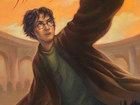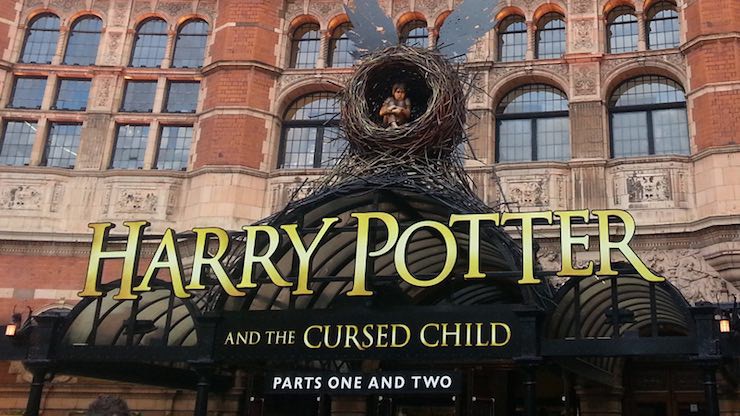It’s still over a month before fans can grab a copy of the eighth installment of the Potter series (in script form no less, I mean, when has there ever been this kind of hubbub over a theatre script?), but I was lucky enough to catch the thing in previews, and while I’m obliged to #KeepTheSecrets, there is still so much to say.
(This will be a non-spoiler review for all the major events and such, but if you are the sort of person who would rather not know a single bit of information before nabbing a copy of the script, I suggest that you skip it all the same.)
The truth is, with such an air of mystery about it, fans haven’t known what to expect from Harry Potter and the Cursed Child. We were told that Harry’s son Albus would feature heavily in it. We learned from cast pictures that we would be seeing Draco and Scorpius Malfoy, along with Ron and Hermione’s daughter, Rose Granger-Weasley. But beyond that, the mechanics of this story were kept well-hidden. For the sake of keeping much of the tale a surprise, here is what I can say: it is a story that revolves primarily around family dynamics, and then more specifically around Albus Potter and his best friend, and all the trouble they get up to as funny young outcasts. Harry, it turns out, is having a difficult time being a good father to Albus because he can’t quite understand the kid—particularly since Hogwarts isn’t a grand old time for his middle child, the same way it was for him.
Harry, Ginny, Ron, Hermione, and Draco own about half of this story as well, getting into the deeper nuances of what it means to be children who fought a war, and then grow up with these expectations and memories attached to them. The show happily does not make light of those traumas; in fact, it goes so far as to address Harry’s PTSD and character flaws that have resulted from having so much heaped on him at an early age. Because Harry was always accustomed to keeping his pain and fear to himself, it has an unfortunate effect on his parenting skills—namely that he doesn’t feel he’s ever allowed to show those fears and be frank about his past around his kids. (If you think that this might cause some serious misunderstandings with Albus, you’d be sadly correct.)
In many ways the breakout character in this generational group turns out to be, remarkably, Draco Malfoy. Cursed Child does an excellent job at addressing how the wizarding world has reacted to former Death Eaters and their children, and Draco is actually given room to expand as a character, far beyond the simple sketch Rowling gave in Pottermore not long ago (which was clearly written with the revelations of the show in mind). But perhaps even more surprising is the fact that when Ron is not on stage, Draco is often the primary comic relief of the story among the adults. It seems that age has taught Draco Malfoy a bit of levity, and it’s a welcome thing to see (particularly when said levity catches people like Harry or Hermione off-guard).
Would that I could transport every person reading this into the theatre to watch these performances. The actors are superbly cast, and when I say that, I mean that if you could project these characters into the future, they would be precisely these people. Noma Dumzweni’s Hermione is hyper-competent as ever, powerful and shrewd (and I can’t give more away than that, but everything she does is AMAZING). Paul Thornley is the Ron Weasley that many have been waiting for—a settled-down fellow who is perfectly content to look after his family and give a hand when his wife and best friend have need of him. Poppy Miller’s Ginny Potter is a perfect combination of pluck and motherly wisdom, funny as ever and comforting as Molly Weasley on her best days. Alex Price’s Draco has all the gravitas expected of a Malfoy, but his edges aren’t quite so sharp. And then we have Jamie Parker as Harry Potter, who seems to have simply slipped the character on like a comfortable old coat. Everything that we know about Harry is there—the sarcasm, the need to protect others at his own expense, the preference for action over any type of work that requires sitting down.
I won’t say too much about the younger actors for fear of giving away too much of their characters, but they are all brilliant in their roles, and have the tougher job of creating these personas from scratch. Albus is a particularly interesting addition to the Potter brood, largely the family black sheep, which can only be rough when your dad is Harry Potter and the rest of your extended family are Weasleys (the most family-oriented crew in the whole of wizardom, probably).

The other reason I wish I could transport everyone to see this show is down to its gorgeous design, beautiful soundtrack, and spectacular effects. There are moments of true magic in this show, tricks done with platforms, lights, and sound that make it seem as though you are witnessing real wizardry. Disappearances, transformations, and shifts of perspective give the whole show an extra oomph. There is a sparseness to the environments that work in their favor, allowing your imagination to fill in the gaps.
Of course, even a play in two long parts cannot be seven—or even one—book. There’s so much more that everyone will be keen to know, and because the play can only provide the answers it provides, there’s a large amount of room for speculations galore. Many characters are omitted entirely or only mentioned in passing due to this constriction, and while it works for the most part, there are sections where you can’t help but wonder where certain people are and what they are thinking. As Albus is the new focal member of the Potter family, we don’t see much of Lily or James. We see nothing of Hugo Granger-Weasley, and while Rose is about, we see far less of her than I’d like. But as long as fans take this show as a slice of the big picture rather than the whole thing, it’s a wonderful story that focuses on interpersonal relationships and how the movement of time effects us all.
Get ready to catch your next train to Hogwarts—you’re in for a real treat.
Emmet Asher-Perrin accidentally stumbled across Noma Dumezweni around the back of the theatre before the show started, and somehow restrained herself from screaming or saying anything embarassing. You can bug her on Twitter and Tumblr, and read more of her work here and elsewhere.











This makes me pretty excited – being in the thick of raising kids myself, it’s so interesting (and sometimes painful) to see how old unresolved issues spill into your parenting or ability to relate to your kid (sometimes for the better, if you can relate to what they are going through and see it in them, but a lot of times it can be negative). This sounds like an interesting take and I’m really interested to see the new Draco. Do you think JKR is backpedalling a bit on statements she’s made that we shouldn’t really view Draco as a good person? Maybe the context of the statement was more that, within the context of the books, girls shouldn’t fall in love with him/think he’s just misunderstood, etc – because it seems like even in some of her Pottermore writings, she’s implied that while he’s perhaps not the person of the year, he’s made somewhat of an effort to leave that type of thing behind; even if he’s not an activist about it.
I admit I have the same trepidations I have for it as I had for things like bringing Star Wars back into the fore (which proved founded for me) – the fact that any type of sequel/continuation involves bringing characters out of a nice retirement to undergo more sufferings and trials can sometimes be taken to an extreme that I don’t get a lot of enjoyment out of (regardless of how compelling and well done the story itself is); but moving on to the new struggles that parenthood can bring is itself also be a really rewarding story to tell. I guess for now I’m just still holding out for a more or less happy ending and resolution of whatever new issues come up with increased character growth/development in a positive direction.
Albus isn’t Emo Kylo Ren, is he? OMG, he’s totally Kylo Ren, isn’t he ;) (That said, if his best friend ends up being Scorpius, I will think that’s actually kind of awesome; assuming the point isn’t ‘and then they decide to bring back the ‘good old days’ of Voldemort’s reign because NO ONE UNDERSTANDS HIM and his real dad is such a dissapointment, ha).
I hope we get some information on what the post Voldemort wizarding society looks like as a whole; what progress have they made (and where are they still struggling), and what are the new conflicts to deal with? But I also understand why as a stage play they might not be able to do that.
I do wish I would be able to see the play in person, but alas my days of extended travel are over. I look forward to receiving the book of the script, since I have it preordered, but I truly hope it will be available for viewing by those of us all over the world not able to see the play in person, such as a DVD, or Pay-Per-View or some other way.
The casting looks and sounds perfect! How long of a run time is the play?
This sounds really cool! I’m so excited for you that you got to see it.
I feel like reading the script won’t be enough…I really want to see it now. It’s probably out of the cards for now as we are already going on vacation this year and there’d be childcare to think of.
I read the spoilers and I find the whole thing atrocious. Mind you(as Ron would say) , this is coming from a major fan, If the plot is the one I have read, I am profoundly disappointed. I am still holding on to hope that all the plot articles are false and this new HP installment isn’t the mess it seems to be.